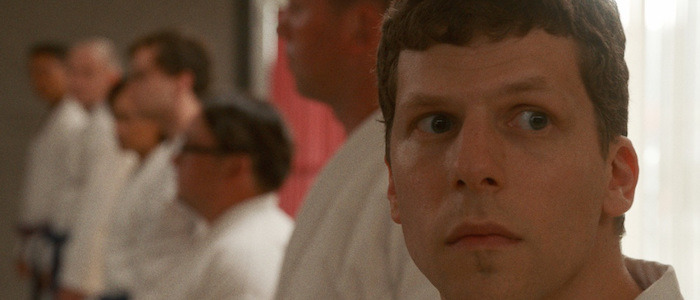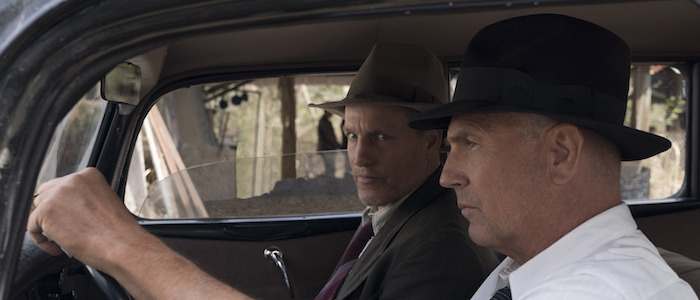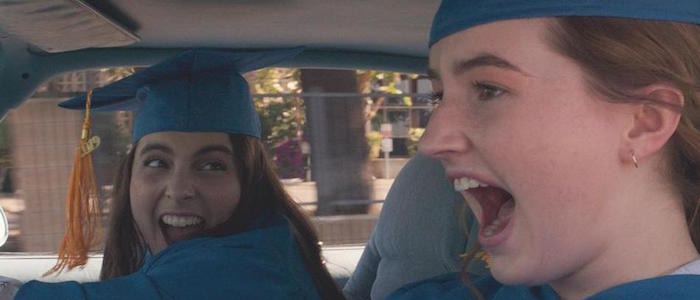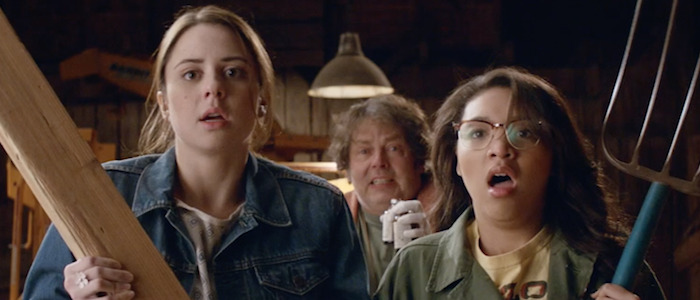SXSW 2019 Day 3: 'The Art Of Self-Defense' And 'Booksmart' Are Instant Comedy Classics And 'The Highwaymen' Is Your Dad's New Favorite Movie
(Welcome to The SXSW Diaries, where we will be chronicling every single movie we see at the Austin-based film festival.)
Welcome to SXSW 2019 day three. In this edition: The Art of Self-Defense is masterful dark comedy about masculinity gone wrong, The Highwaymen is perfectly decent dad-tainment, Booksmart redefines the high school comedy for 2019, and Snatchers can't quite capture its tricky blend of comedy and horror.
The Art of Self-Defense
What if Fight Club was remade by the Coen brothers? Perhaps it's unfair and reductive to compare Riley Stearns' incredible new dark comedy to well-known work and acclaimed filmmakers, but with a tone this unique and a sense of humor this specific, I grasp at straws to relay just how special (and just how twisted) this film truly is. This may be a movie about a man who starts taking karate lessons after he's mugged in the streets outside his home, but it's certainly not a tale of finding oneself and becoming the better person you always dreamed of. Oh, no. Stearns uses that set-up to explore how impressionable men are seduced into toxic communities, how good people are transformed into monsters because they need to feel powerful and respected. It's the dry, pitch-black comedy 2019 deserves.
It's difficult to describe Stearns' idiosyncratic sense of humor, which exists in an undefinable space between dry realism and the genuinely absurd. The same goes for the world of his film, which seems to take place in a city that could exist anywhere, in a time that could be...well, sometime in the '90s. Maybe. There's a stylized manner in which characters speak and an offbeat sensibility to the world they inhabit, and the whole thing walks a difficult tightrope. I'm reminded of the fastidiousness of Wes Anderson, albeit less precious and less overtly stylized.
The important thing is the actors understand exactly how to make Stearns' dialogue, full of straightforward absurdities delivered like bonafide truths, sing. Jesse Eisenberg leans into his strengths as a man who finds an identity through karate, even if that identity warps everything kind and decent about him. As the hardened student and kids' class instructor, Imogen Poots is dryly funny and tremendously sad.
However, Alessandro Nivola (increasingly one of the most omnipresent and quietly impressive character actors out there) leaves a deep and disconcerting impression as Sensei, the ultra-masculine leader of his strip mall karate dojo and the man to whom all of his male students aspire to emulate. He's charismatic, tough, and wraps himself in so much mystique that his classes never realize that he's full of bullshit. And that he's incredibly evil. Nivola is hilarious, but he accomplishes that without the crutch of easy jokes – this is a villain for the times in which we live, a figure so absurd that of course he's created a passionate following of young men hanging on his every word.
The Art of Self-Defense gets bleaker as it goes and like a lobster, you don't realize you're in boiling water until it's far too late. This is a dark film, one that pulls no punches and gently escalates the depravity and the pain until you realize you can't back out. Stearns never lessens the comedy as darkness overtakes the narrative, but he does couple it with more unpleasant truths. It's a tonal balance that has no right to work as it does. It's almost like Stearns, whose 2014 thriller Faults is also worth your time, is a director on the verge of being the next big thing. Well, maybe that's because he is./Film Rating: 9 out of 10
The Highwaymen
Imagine, if you will, Netflix's algorithm looking over its library, running some numbers, and deciding that it needed more movies for your dad. Enter The Highwaymen, a handsomely made and quietly macho movie about the two cowboy cops who ultimately tracked down and killed Bonnie and Clyde.
John Lee Hancock, the director of perfectly good movies like The Founder and The Rookie and easily digestible junk like The Blind Side and Saving Mr. Banks, does what he does best with The Highwaymen: he aims right down the middle and delivers something dependable and solid. No one is going to credit this film for its historical accuracy (googling the chief subjects of the film will reveal a Hollywood-ization of these men that is straight-up laughable), but if you want Kevin Costner and Woody Harrelson wearing cowboy hats and reflecting on violence for two hours as they drive around the beautifully shot American south, well, you'll get exactly what you want.
At times, The Highwaymen flirts with being a far more interesting movie. Costner and Harrelson's Texas Rangers are men born a few decades too late, killers built for the Wild West who now have to spend their older years watching America transform into something completely new: a place where the criminals they used to hunt down and slaughter have become beloved celebrities. It's a fascinating dynamic, but one that Hancock frequently plays down to emphasize that these two cowboys are the black-and-white heroes of a story that deserves a murky shade of gray. The film doesn't quite glorify their beyond-the-law tactics, but it certainly doesn't argue with them. Even as the characters pause to discuss the unspoken traumas of a violent life, the movie can't help but think "man, these guys are cool."
The Highwaymen is going to scratch a specific itch for many people. This kind of period drama for adults doesn't make it to theaters much these days and I'm glad it has a home on Netflix already. Dads need movies, too. But like the characters at the heart of the story, this one feels like it's an effective engine arriving at the wrong time./Film Rating: 6.5 out of 10
Booksmart
I was not expecting for the credits to roll on Booksmart with me thinking "Wow, did Olivia Wilde just make her directorial debut with one of the funniest and sweetest and most brutally honest high school coming-of-age movies I have ever seen?" But yes, that's exactly what I thinking, because this movie is an instant revelation. As far as comedic snapshots of young life in the '10s go, it ranks up there with the massively underrated The Edge of Seventeen. As far as raunchy tales of tested friendships go, it feels like a redefinition of the genre. As tempting as it is to call this "Superbad with women," that's unfair. Mainly because Booksmart is so much better.
Beanie Feldstein and Kaitlyn Dever light up the screen as Molly and Amy, two progressive, feminist overachievers who realize on the last day of school that they've wasted their teens studying rather than partying and having fun. After all, all of the supposed knuckleheads in their class are also going to their dream colleges and they did it while also drinking and doing dumb shit. So cue the obsessive and brash Molly and the shy, low-key Amy setting out for a night of high school partying while they still have the chance. And also cue general chaos as things go very (and hilariously) wrong.
Even with this familiar set-up, Booksmart isn't happy to color within the lines of the high school coming-of-age comedy. Instead, Wilde and her credited team of all-female screenwriters create a brand new page in the coloring book, a tale of friendship and understanding and general goddamn horniness that feels uniquely shaped for 2019. Molly and Amy drink and do drugs (cue a gonzo stop-motion hallucination sequence!) and learn things about each other and their classmates that change their worldview and, wait for it, shape them to be better and more humane people. And while the raunch is heavy and crude, Booksmart hits hard. Its depiction of a female friendship is heartwarming, sad, and sweet, but anyone who was a loser in high school (this writer slowly raises his hand) will relate to the misadventures of Molly and Amy, social outcasts whose only fuel is ambition – someday, it will all get better. It has to. Right?
While Wilde populates the film with supporting roles from incredible adult talent (Jason Sudeikis, Will Forte, Lisa Kudrow, and Jessica Williams are as funny as you'd hope), Feldstein and Dever make for a remarkable duo. Feldstein's Molly is a refreshing change of pace for the high school movie dork: outspoken, proud of her accomplishments, and domineering. Dever's Amy is going to hit home with many people, especially those who spent their high school years painfully struggling with the LGBTQ person they are inside their mind despite never having the ability and the bravery to act on those thoughts and hopes (this writer slowly raises his hand again).
I left Booksmart in love with not just the two leads, but the entire cast of fresh talent (although Billie Lourd deserves a special shout-out for her inspired work as a demented but well-meaning fellow student). And I also left Booksmart thrilled that Olivia Wilde, an undeniably talented actress, has made such a confident, honest, and funny movie about what it means to be young, confused, and not nearly as intelligent as you think you are. It's rare to wonder if a film may be a generational touchstone the morning after you see it. Well, I'm wondering that right now.
/Film Rating: 9 out of 10
Snatchers
Juggling comedy and horror is difficult. Nearly impossible, even. Absurdly difficult. Edgar Wright, Joe Dante, Joss Whedon, and Sam Raimi make it look easy. Snatchers reminds us that striking the right tonal balance with this kind of movie is a ride-or-die situation. One wrong move and the entire structure falls apart. And while this film has its heart in the right place every step of the way, and while it will find genre hounds who love it to death, the balancing act is awkward at best and cringe-worthy at worst.
Snatchers peaks early, when high schooler Sara wakes up nine months pregnant (despite being not nine months pregnant the night before), rushes to an abortion clinic, and promptly gives violent birth to an alien creature that promptly goes on a gore-soaked killing spree. This scene, with its combination of goofy humor and splattery practical violence, sets a high bar for the rest of the film – it's funny and wild and wet. Unfortunately, the film starts sputtering soon after, mistaking volume for comedy and cliched quirks for character development. Snatchers' practical effects never stop being a delight, but the characters surrounding them never do much more than shout, if they get to shout at all before they serve their plot function and get killed off.
To be fair, Snatchers played quite well to a midnight audience and we'll be running a very positive full review from /Film contributor Matt Donato very soon (if it's not live by the time you read this). But I wish the writing in Snatchers was as assured, and as lovingly crafted, as its monsters and exploding heads.
/Film Rating: 4 out of 10




